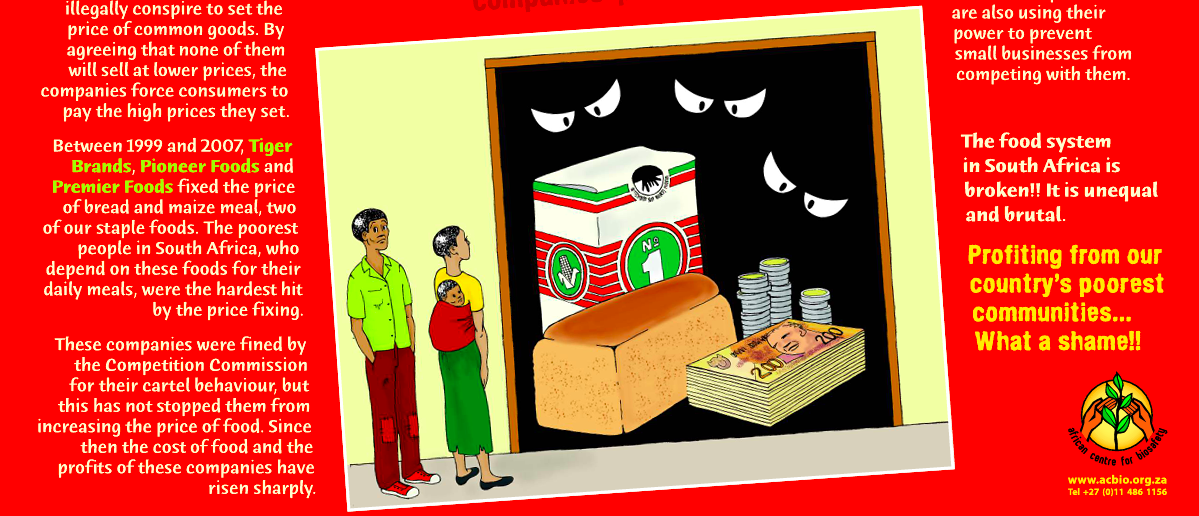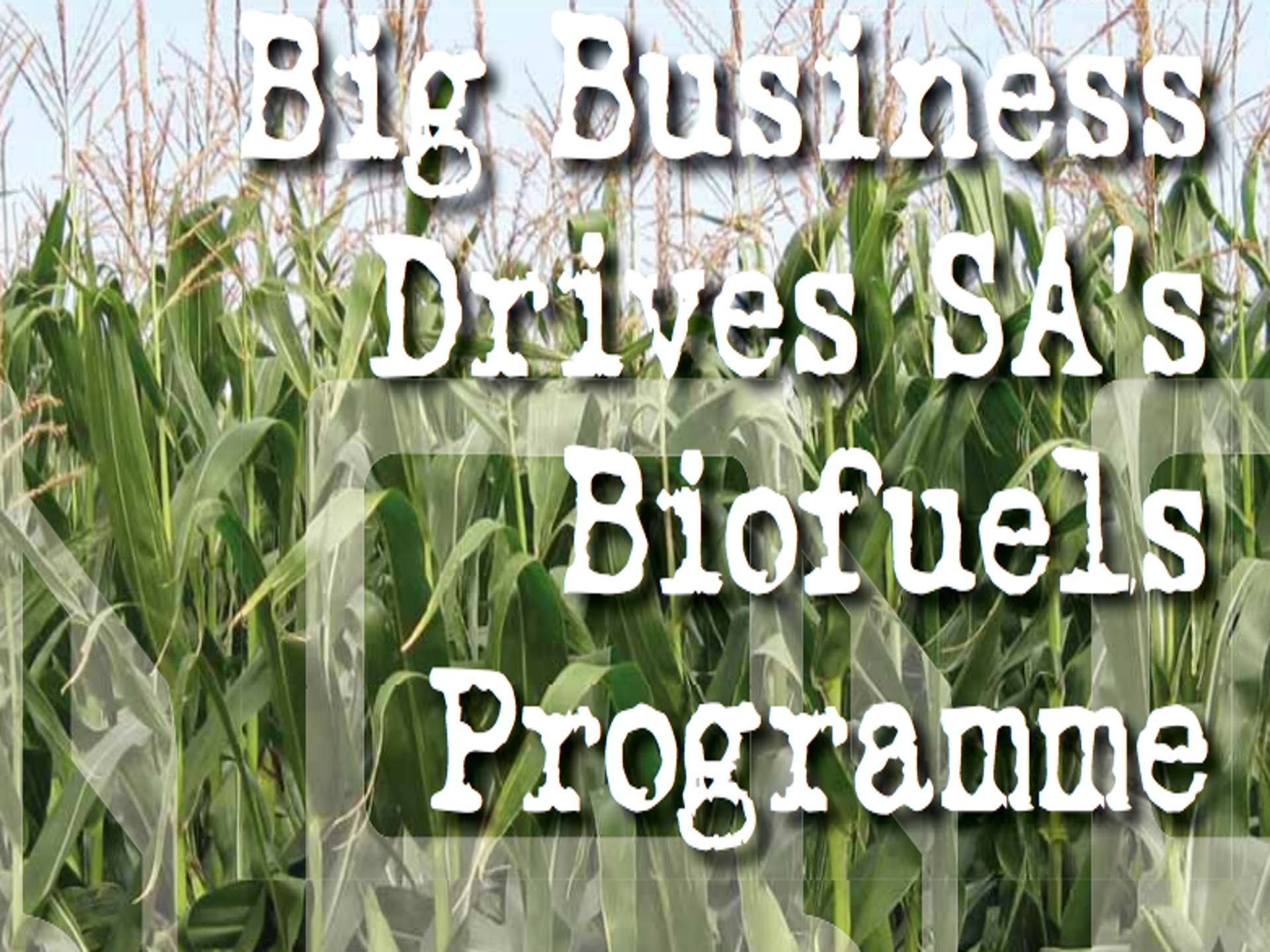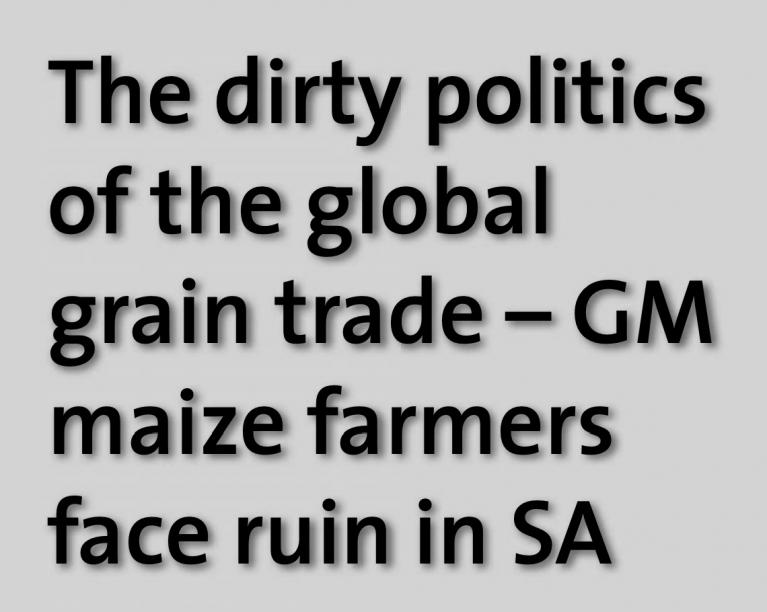Latest Agribusiness Resources
3 December 2014
Who owns our food systems: Fixing the price of food
Between 1999 and 2007, Tiger Brands, Pioneer Foods and Premier Foods fixed the price of bread and maize meal, two of our staple foods. The poorest people in South Africa, who depend on these foods for their daily meals, were the hardest hit by the price fixing. Download this factsheet: English | Afrikaans | Sotho […]
READ2 September 2014
Africa an El Dorado for South Africa’s Agribusiness Giants
South African agribusinesses are aggressively expanding into Africa in search of profits from a relatively untapped consumer market with rising income levels and to escape the country’s negative economic conditions. This paper traces this expansion and outlines the implications for Africa’s market structure, food security and food sovereignty movements, as well as exploring the potential […]
READ18 November 2013
Giving With One Hand and Taking With Two: A Critique of AGRA’s African Agriculture Status Report 2013
The African Centre for Biosafety (ACB) has released a comprehensive critique of a report published by the African Alliance for a Green Revolution in Africa (AGRA). The analysis of AGRA’s African Agriculture Status Report 2013 reveals that AGRA’s vision is premised on Public-Private Partnerships in which African governments will shoulder the cost and burden of […]
READ15 May 2013
STATEMENT BY CIVIL SOCIETY IN AFRICA
MODERNISING AFRICAN AGRICULTURE: WHO BENEFITS? African agriculture is in need of support and investment. Many initiatives are flowing from the North, including the G8’s “New Alliance for Food Security and Nutrition in Africa” and the Alliance for a Green Revolution in Africa (AGRA). These initiatives are framed in terms of the African Union’s Comprehensive African […]
READ25 September 2012
Open Letter to African Governments and AGRA (The Alliance for a Green Revolution in Africa)
The undersigned 28 civil society organisations support and represent the interests of smallholder farmers and livestock keepers from Ethiopia, Kenya, Mozambique, South Africa, Tanzania, Uganda, Zambia, and Zimbabwe, and are concerned with the conservation of agricultural biodiversity for livelihood security and food sovereignty. View the full statement here.
READ15 May 2012
Big Business Drives SA’s Biofuels Programme
In late February 2012 leading figures from the fossil fuel industry met in Pretoria to forge ahead with the government’s highly controversial plans for an SA biofuels industry. The catalyst for this meeting was the publication by the government last September of draft regulations for the mandatory blending of biofuels in the nation’s fuel supply. […]
READ8 September 2010
The dirty politics of the global grain trade – GM maize farmers face ruin in SA
Recently, the South African press reported on the possible bankruptcy faced by maize farmers. The African Centre for Biosafety (ACB) has today released a new report titled “The dirty politics of the global grain trade – GM maize farmers face ruin in SA” which provides an analysis of why South Africa’s record 13 million ton […]
READ17 April 2010
An Open Letter to Oxfam America
Sent from the following concerned groups: African Center on Biodiversity, South Africa (Mariam Mayet, Executive Director) Bharatiya Krishak Samaj/Indian Farmers Association, India (Krishan Bir Chaudhary, President) Center for Food Safety, U.S. (Debi Barker, International Director) CNOP (Coordination Nationale des organizations Paysannes/ National Coordination of Peasant Organizations), Mali (Ibrahima Coulibaly, President) Grassroots International, US (Nikhil Aziz, […]
READ13 February 2008
South Africa’s Biofuels Strategy: greenwashing agribusiness interests
The impetus for the establishment of a biofuels industry in South Africa also came from industry lobbyists under the banner of the Southern African Biofuels Association (SABA). Consequently, the South African government published a feasibility report and a draft Biofuels Industrial Strategy in 2006, which proposed the establishment of a mandatory bioethanol target of 8% […]
READ





